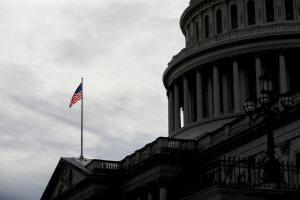Democrats in U.S. Congress aim to pressure Republicans with go-it-alone
funding bill
 Send a link to a friend
Send a link to a friend
 [December 09, 2022]
By Richard Cowan [December 09, 2022]
By Richard Cowan
WASHINGTON (Reuters) - Democrats in the U.S. Congress plan to unveil a
bill to fund the government through the end of the current fiscal year
in a bid to pressure Republicans ahead of a Dec. 16 funding deadline, a
top Senate Democrat said on Thursday.
Republicans, who will take the majority in the House of Representatives
next year and whose votes would be needed this month in the Senate to
pass the $1.5 trillion-plus measure, voiced immediate objections as the
bill contains increased spending for domestic programs that
conservatives oppose.
Congress has until Dec. 16 to either pass an "omnibus" bill funding the
government through Sept. 30, 2023, or a shorter "continuing resolution"
to avoid a partial government shutdown. Some conservative Republicans
have urged a short-term bill, to delay talks on a full-year bill into
January when they will have a stronger negotiating position.
Democratic Senate Appropriations Committee Chair Patrick Leahy on
Thursday said he considered the proposal "fair and bipartisan."
It would fund the Defense Department at the record $858 billion
contained in the National Defense Authorization Act bill now making its
way through Congress, he said, but would also include increases to
non-defense domestic programs that conservative Republicans oppose.

Democrats would need the support of 10 Republicans to pass the measure
in the 50-50 Senate.
Senate Republican Leader Mitch McConnell drew a hard line in opposition.
"Passing a defense authorization bill and appropriating the money our
military needs are not right-wing demands that Democrats get unrelated
goodies for going along with," McConnell said in a speech shortly after
Leahy's. "We won't allow (Democrats) to now hijack the government
funding process ... and take our troops hostage for even more spending."
[to top of second column]
|

An American flag flies over Capitol Hill
in Washington, U.S., December 8, 2022. REUTERS/Amanda
Andrade-Rhoades.

Earlier this week, Senator Richard Shelby, the top Republican
appropriator, told reporters the two sides were only about $25
billion apart, which he described as "pretty close" to agreement.
That would represent about 1.7% of this year's $1.5 trillion budget.
House Republican Leader Kevin McCarthy, who is vying to become the
next speaker when his party takes majority control of the House on
Jan. 3, has been pushing for significant spending cuts -- putting
McConnell in a difficult negotiating position.
For the last several years, Congress has appropriated government
funding that was roughly evenly split between defense and
non-defense programs. Conservative Republicans have long wanted to
move away from that funding formula.
If the Democrats' effort fail in the Senate next week, Congress
might have to resort to a stop-gap funding bill that simply extends
current funding levels.
The last time Democrats and Republicans could not settle on such
legislation, a record-long, 35-day shutdown ensued, spanning from
Dec. 22, 2018, until Jan. 25, 2019. The main stumbling block was
over then-President Donald Trump's demand for large new investments
in a U.S.-Mexico border wall that many saw as ineffective and
wasteful.
(Reporting by Richard Cowan; Editing by Scott Malone and Leslie
Adler)
[© 2022 Thomson Reuters. All rights
reserved.]
This material may not be published,
broadcast, rewritten or redistributed.
Thompson Reuters is solely responsible for this content.
 |